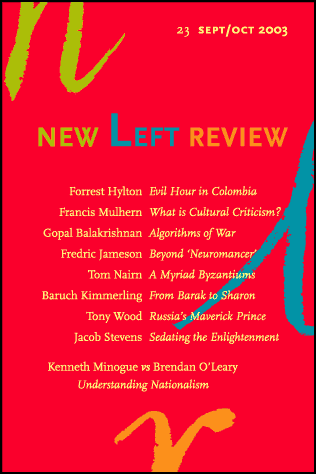The theoretical structure of the most ambitious projection of the American empire to date, and its political attachment to the Clinton Presidency. History and strategy, rhetoric and realities, in Philip Bobbitt’s Shield of Achilles.
Meanings of culture, the place of politics and role of intellectuals in the practice of criticism, as conceived since Arnold. Replying to Stefan Collini in NLR 18, Francis Mulhern asks how far the arts of a conversible portraiture bear on a critical agenda.
The longue durée of Uribe’s Colombia, from its origins in the mid-19th century, through the Violencia of the postwar years, to the coming of today’s guerrillas, narco-traffickers and paramilitaries. Conditions and prospects of the latest campaign to wipe out armed insurgency against Latin America’s oldest ruling order.
To when should the emergence of nationalism be dated? How should its distinctive ideological features be characterized? What consequences follow for ethnic conflicts today? Kedourie, Oakeshott and Gellner as markers in the rival views that followed.
To when should the emergence of nationalism be dated? How should its distinctive ideological features be characterized? What consequences follow for ethnic conflicts today? Kedourie, Oakeshott and Gellner as markers in the rival views that followed.
Reflections on William Gibson’s Pattern Recognition: a contemporary dialectic of style, as the Verne of cyberspace turns to the branded present and its nauseas.
After ethnic definitions of collective identity, is a new scenery—hybrid cultures intertwined with a universal genome—becoming visible? Could St John Perse’s cosmopolis on the Bosphorus furnish a template for a world beyond national and multicultural imaginings?
Baruch Kimmerling on Ran Edelist, Ehud Barak: Fighting the Demons. Israel’s killer general and his legacy, as Camp David morphs into the Road Map.
Jacob Stevens on Emma Rothschild, Economic Sentiments. Smith and Condorcet compacted into icons for the social market.
Tony Wood on G. S. Smith, D. S. Mirsky. A Russian–English Life. White Guard officer, Eurasian exile, and repatriated Marxist—the prince who rewrote Russian literary history.
